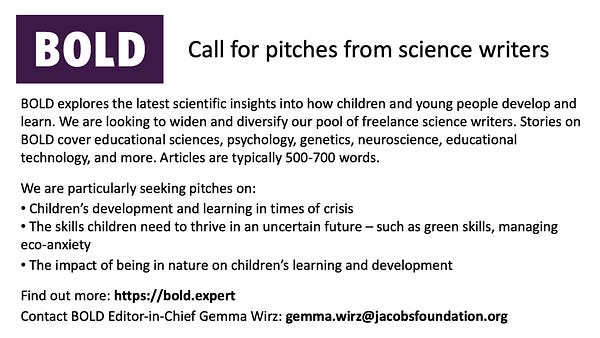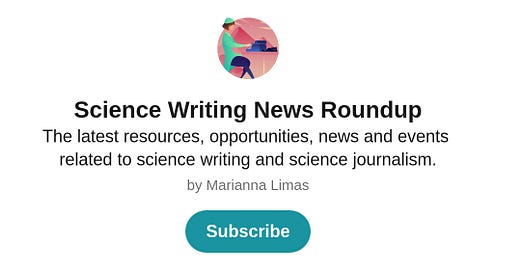✍️Science Writing News Roundup #105 (July 7, 2022)
How to get started in science writing + How to pitch stories and build relationships with editors.
Welcome! You are reading the Science Writing News Roundup, a newsletter for science writers. You can also read this edition online. Did someone forward you this newsletter? Sign up here.
Resources
How to get started in science writing (👉Bonus content for monthly supporters)
How to pitch stories and build relationships with editors. 🤝
9 tips for investigative journalists to improve their writing.
Enjoy work with these sounds: In this post, Jeremy Caplan shares some of his favorite free listening resources. 🎶
New tip sheet explores health equity in reproductive health care.






Opportunities
Calls for pitches: Write about abortion, the ocean, nature, science, philosophy, health and parenting + Reporting grants for journalists (Bonus content for monthly supporters🚀)
Earth Investigations Programme: This grant program supports cross-border teams of professional journalists and/or news outlets to conduct investigations into environmental affairs related to Europe. 🌍
Entries are now open for the 2022 Thomson Foundation Young Journalist Award. It has given a boost to some brilliant journalists over the years, each one of them demonstrating a rich tapestry of investigative journalism, exposing social issues and holding power to account.


Articles
How Nature and TBIJ measure the impact of their journalism: The majority of journalists will tell you they got into the profession in order to help people and to make change. How can newsrooms measure if we are achieving this goal? 📏
Reporting on climate change, a complex task: challenges and solutions. How could journalists get better at covering climate change? 🎤
Might, maybe, must: The evolution of certainty in COVID-19 reporting. It’s tempting to believe that facts speak for themselves. That, no matter how it is presented, data is data. 🔬
Ankur Paliwal tells the tale of a rare genetic disorder and people who live with it. Paliwal’s story is a shining example of empathetic writing—in that it spotlights nuances of the patients’ and caregivers’ experiences, as well as those of the researchers tirelessly working on the disease.
Tips
Loneliness among older people: A research roundup and 5 tips for covering the topic. Questions about the health effects of loneliness have motivated an explosion of new research over the past few years, particularly since social distancing during the COVID-19 pandemic has raised new fears about loneliness levels worldwide.
Videos
Is science really under attack? With Jim Al-Khalili | Ethics & Society
How Tech Can — and Can’t — Eliminate Barriers to Good Health Care
A Cochrane conversation on using systematic reviews. Cochrane experts apply a rigorous methodology to their systematic reviews to minimize bias and produce more reliable, higher quality research findings.
Northwest Science Writers Association: Neuroscience of You with Chantal Prat
How and why journalists and civil society organizations work together
Events
Mental health and journalism: How journalists can responsibly report on it and take care of themselves (June 27 - July 31, 2022)
ECSJ 2022 – European Conference of Science Journalism (July 10-13, 2022)
So, You Want to Write a Book… (July 12, 2022)
Introduction to podcasting (July 13, 2022)
Secure Your Twitter and Facebook Accounts (July 14, 2022)
Rural Health Journalism Workshop 2022 (July 14, 2022)
Copywriting for freelance journalists (July 14, 2022)
Protest Protocol: How journalists can stay safe in times of unrest (July 15, 2022)
Hands-on Mapping for Journalists: How to use geographical data to improve your stories (July 11 - August 7, 2022)




Jobs and internships
To view the science writing jobs and internships below, please click here to become a member! 💛
Internship, US-based
Communications intern, CA
Journalism internship, UK
Editor, DC
Climate Reporter, DC
Science Writer, CA
Writer, MD
Science Writer, PA
Communications Specialist, CA
Editor-in-Chief, US-based
Writer/Editor, US-based
Lecturer, Canada
Digital Content Manager, UK
Director of Communication, US-based
Communications Officer, Finland
Science Communicator, Sweden
Social Media Editor, Remote
👉 Thanks for reading! Subscribe for free to receive the next post in your inbox:
Worried you missed something? See previous posts here. What would you like to see in the newsletter? Please send me your suggestions: sciencewriting@substack.com


